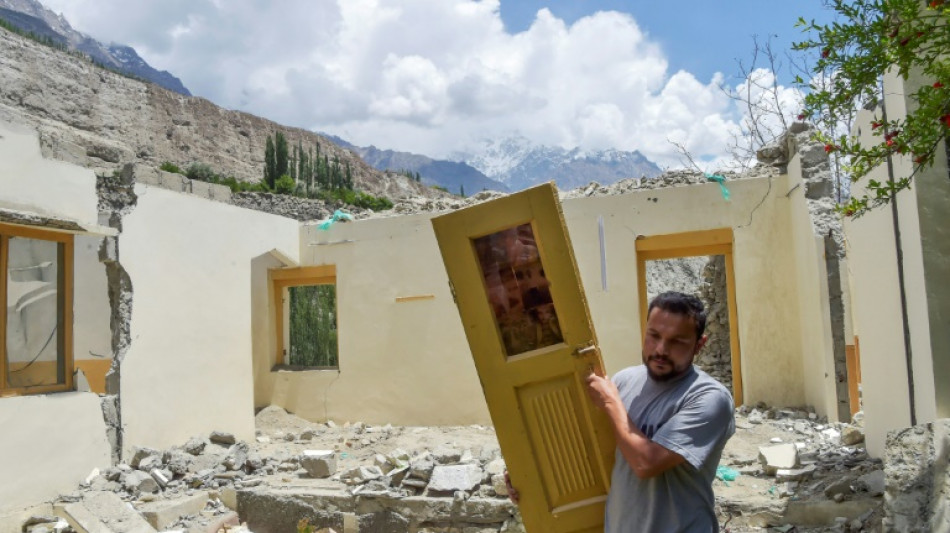
-
 US freestyle skier Ferreira wins Olympic halfpipe gold
US freestyle skier Ferreira wins Olympic halfpipe gold
-
Svitolina edges Gauff to set up Pegula final in Dubai

-
 'Proud' Alcaraz digs deep to topple Rublev and reach Qatar final
'Proud' Alcaraz digs deep to topple Rublev and reach Qatar final
-
UK govt considers removing ex-prince Andrew from line of succession

-
 New study probes why chronic pain lasts longer in women
New study probes why chronic pain lasts longer in women
-
Trump vows 10% global tariff after stinging court rebuke

-
 Aston Martin in disarray as Leclerc tops F1 testing timesheets
Aston Martin in disarray as Leclerc tops F1 testing timesheets
-
Venus Williams accepts Indian Wells wild card

-
 Anxious Venezuelans seek clarity on new amnesty law
Anxious Venezuelans seek clarity on new amnesty law
-
Last-gasp Canada edge Finland to reach Olympic men's ice hockey final

-
 Scotland captain Tuipulotu grateful for Wales boss Tandy's influence
Scotland captain Tuipulotu grateful for Wales boss Tandy's influence
-
Zelensky says no 'family day' in rare personal interview to AFP

-
 Zelensky tells AFP that Ukraine is not losing the war
Zelensky tells AFP that Ukraine is not losing the war
-
Sweden to play Switzerland in Olympic women's curling final

-
 Counting the cost: Minnesota reels after anti-migrant 'occupation'
Counting the cost: Minnesota reels after anti-migrant 'occupation'
-
UK police probe Andrew's protection as royals reel from ex-prince's arrest

-
 Doris says Ireland must pile pressure on England rising star Pollock
Doris says Ireland must pile pressure on England rising star Pollock
-
US military assets in the Middle East

-
 Neymar hints at possible retirement after World Cup
Neymar hints at possible retirement after World Cup
-
Stocks rise after court ruling against US tariffs

-
 Australia end dismal T20 World Cup by thrashing Oman
Australia end dismal T20 World Cup by thrashing Oman
-
Olympics chief says Milan-Cortina has set new path for Games

-
 Russian SVR spy agency took over Wagner 'influence' ops in Africa: report
Russian SVR spy agency took over Wagner 'influence' ops in Africa: report
-
Pegula fights back to sink Anisimova and reach Dubai final

-
 Trump administration denounces 'terrorism' in France after activist's killing
Trump administration denounces 'terrorism' in France after activist's killing
-
Colombia's Medellin builds mega-prison inspired by El Salvador's CECOT

-
 German broadcaster recalls correspondent over AI-generated images
German broadcaster recalls correspondent over AI-generated images
-
US Supreme Court strikes down swath of Trump global tariffs

-
 England's Itoje says managing 'emotional turmoil' key to 100 cap landmark
England's Itoje says managing 'emotional turmoil' key to 100 cap landmark
-
Trump says weighing strike on Iran as Tehran says draft deal coming soon

-
 Tudor is '100 percent' certain of saving Spurs from relegation
Tudor is '100 percent' certain of saving Spurs from relegation
-
Azam dropped for scoring too slowly, says Pakistan coach Hesson

-
 Stocks volatile after soft US growth data, court ruling against tariffs
Stocks volatile after soft US growth data, court ruling against tariffs
-
Italy bring back Capuozzo for France Six Nations trip

-
 From Malinin's collapse to Liu's triumph: Top Olympic figure skating moments
From Malinin's collapse to Liu's triumph: Top Olympic figure skating moments
-
Arteta urges Arsenal to 'write own destiny' after title wobble

-
 Ukraine Paralympics team to boycott opening ceremony over Russian flag decision
Ukraine Paralympics team to boycott opening ceremony over Russian flag decision
-
Wales captain Lake wants fans to bring 'noise' against Scotland

-
 Skier Vonn's Italian hospital a hotbed of men, sister says
Skier Vonn's Italian hospital a hotbed of men, sister says
-
India target S.Africa top order, Abhishek to come good: bowling coach

-
 Carrick praises Man Utd 'diversity' after Ratcliffe's immigrant rant
Carrick praises Man Utd 'diversity' after Ratcliffe's immigrant rant
-
I never thought it would be hit, says 'Scream' creator 30 years later

-
 AI summit statement delayed to 'maximise' signatories: India
AI summit statement delayed to 'maximise' signatories: India
-
Barcelona's Sagrada Familia basilica hits peak height

-
 Milan sprints to second straight UAE stage win as Tiberi keeps lead
Milan sprints to second straight UAE stage win as Tiberi keeps lead
-
US GDP growth misses expectations as Trump blames shutdown

-
 Benfica investigate video of fans' monkey gestures
Benfica investigate video of fans' monkey gestures
-
French minister pledges tight security at rally for killed activist

-
 Guardiola 'couldn't care less' about Arsenal stumble in title race
Guardiola 'couldn't care less' about Arsenal stumble in title race
-
UK police search property as royals reel from Andrew's arrest


Glacier lakes swollen by global warming threaten millions
Violent flooding from glacier lakes formed or enlarged by climate change threatens at least 15 million people worldwide, most of them in four countries, researchers said Tuesday.
More than nine million people across so-called High Mountain Asia live in the path of potential glacial lake outburst floods, including five million in northern India and Pakistan, they reported in Nature Communications.
China and Peru are also especially exposed to the danger of abrupt flooding from melting glaciers, according to the study, the first global assessment of areas most at risk.
The volume of lakes formed as glaciers worldwide disintegrate due to global warming has jumped by 50 percent in 30 years, according to a 2020 study based on satellite data.
Earth's average surface temperature has risen nearly 1.2 degrees Celsius since preindustrial times, but high-mountain regions around the world have warmed at twice that pace.
Glacier lakes are particularly unstable because they are most often dammed by ice or sediment composed of loose rock and debris. When accumulating water bursts through these accidental barriers, massive flooding can occur downstream.
This kind of flooding has been responsible for thousands of deaths in the last century, as well as the destruction of communities, infrastructure and livestock.
"It's not the areas with the largest number or most rapidly growing lakes that are most dangerous," said lead author Caroline Taylor, a doctoral student at Newcastle University in England.
"Instead, it is the number of people, their proximity to a glacial lake, and, importantly, their ability to cope with a flood that determines the potential danger," she explained.
Thousands of people, for example, have been killed by glacier lake outburst floods in High Mountain Asia but only a handful in North America's Pacific Northwest, even though that region has twice as many glacial lakes.
To carry out the study, Taylor and her colleagues compared three sets of data: the number and condition of lakes fed by melt-water, the number of people living within 50 kilometres of a glacial lake basin, and how prepared communities are to cope with disaster should it arrive.
Some 90 million people across 30 countries live in 1,089 glacial lake basins, they found. 15 million of them reside within one kilometre of the track an outburst flood would take.
- Exposure vs. vulnerability -
Pakistan is home to more than 7,000 glaciers in the spectacular Himalaya, Hindu Kush and Karakoram mountain ranges, more than anywhere else on Earth outside the poles.
Last summer, on the heels of a two-month heat wave and during sustained rains that followed, raging torrents from melting glaciers in northern Pakistan ripped up thousands of kilometres of roads and railway tracks, destroyed bridges, and washed away entire villages.
In Peru, a 41-year-old farmer who lives in mountains near the city of Huaraz has filed suit against the German firm RWE, saying its greenhouse gas emissions are partly responsible for the melting of nearby glaciers.
Last year a delegation of German judges visited the region to determine what risk the expanding lake below the Palcacocha glacier poses to city of Huaraz and its 120,000 inhabitants.
Half of the Earth's 215,000 glaciers and a quarter of their mass will melt away by the end of the century even if global warming can be capped at 1.5 degrees Celsius, the ambitious Paris Agreement target that many scientists now say is beyond reach, a recent study found.
Over the past century, a third of global sea-level rises came from glacier melt, according to earlier research.
M.Fischer--AMWN



